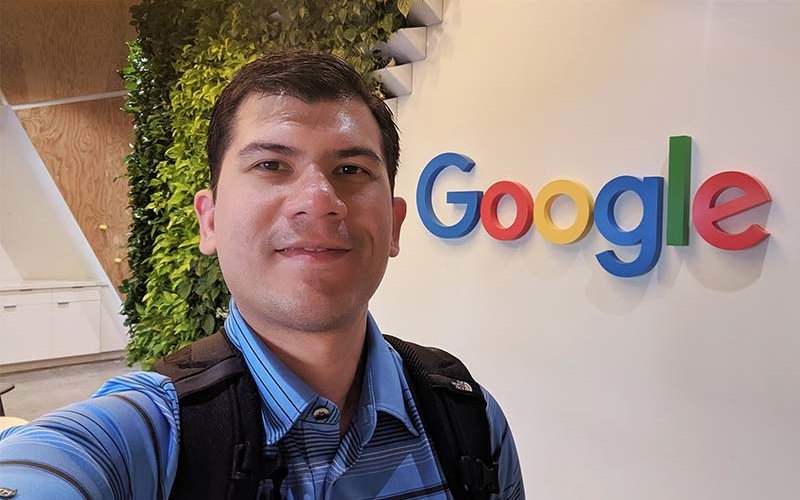
Computer scientist Paul Salvador Inventado spent four weeks this summer immersing himself in all things Google. In a behind-the-scenes, one-of-a-kind experience, Inventado participated in Google’s Faculty in Residence program.
Inventado, assistant professor of computer science, was selected for the program and worked at the company’s Mountain View headquarters during June. He participated in hands-on, project-based learning workshops and explored resources to augment course curriculum. He also learned about the technical interviewing process, and experienced firsthand, Google’s engineering culture.
The opportunity gave him the chance to collaborate with others in his discipline and create learning materials to use in his own classroom.
Why Google?
I was attracted to the program because it would allow me to help our students prepare for careers in technology. Our students are more than capable of getting careers at good tech companies like Google. However, many students are unaware of such opportunities, while others need a little guidance so they can perform well in a job interview.
What did you learn?
I attended workshops that focused on applying project-based learning in our computer science courses and helping our students prepare for careers in technology. The project-based learning, or PBL, workshops taught different ways to promote hands-on activities that give students opportunities to apply concepts discussed in class. In my case, I’ve redesigned the project component of the “Object-Oriented Programming” course that I am teaching this fall to follow this approach. I’m making the project activity more appealing for students by giving them experience in building long-term projects that model the type of work they will do in their careers. I’ll also introduce them to software development tools and methods used in industry practice. Research shows that PBL is effective because students are more engaged in projects that they select for themselves and they retain more information when it is applied, compared to memorizing it. Ultimately, students gain experience and learn the skills needed for today’s technical workforce. I also attended workshops on resume preparation, programming resources, and strategies and tips for leading activities to help students prepare for tech interviews, including internships and career opportunities at Google.
How is your Google experience informing your teaching?
It definitely changed how I will manage projects in my class. I see the importance of giving students a choice over what they want to work on because this is much more motivating for them than being assigned to work on something they feel is less important. Projects should not only focus on the content covered in class, but also build experience and expose them to the type of work they will perform in the future. I’ve also started a new lab called the Intelligent Learning Experience Lab, in which I’m modeling the structure of how it is managed, as well as the design of software projects, from what I learned at Google.
What skills do tech companies want in new graduates?
Tech jobs are not easy to get, especially with large companies like Google. Most tech companies look for students with a good understanding of basic programming concepts, specifically data structures and algorithms. Software engineers need to be capable of learning other programmers’ code, be humble in asking for help, have the initiative to learn, and be excited to collaborate with other members of their team. Googlers that I talked to emphasized the importance of putting in the effort to prepare for interviews. Students are capable of getting into these companies, despite the difficulty in applying. I’ll be telling my students that anything is possible as long as they put in the effort and keep pushing forward.
What was most fascinating?
What I loved the most about Google’s culture is their inclusive work culture and willingness to help each other despite their busy schedules. The company has various groups that support employees’ interests, values each person’s ideas, and invests time, effort and money to pursue them. I was fascinated to see that at the end of the day, Google is just a group of people sharing their ideas and finding ways to help each other achieve a shared goal. Google engineers even graciously shared their time to give me their thoughts on my planned activities for the fall semester. What was unexpected is Google’s Mountain View complex houses over 40 different cafes. I must have gained 10 pounds from all of the free food!
Students and others can contact Inventado for more information.